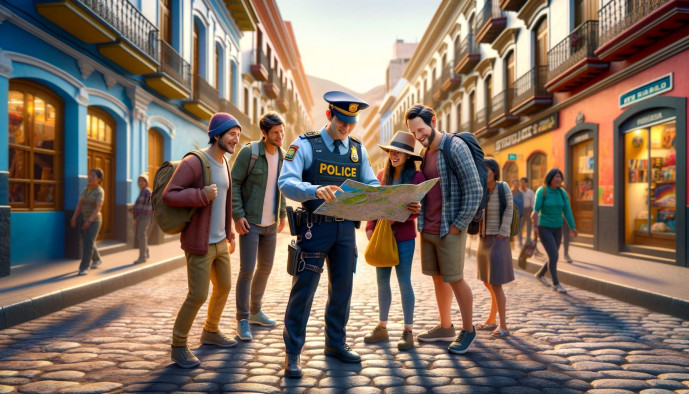Safety in Bolivia
Explore essential safety tips for travel and life in Bolivia, from crime to health risks.

Understanding Safety in Bolivia
General Safety Overview
Bolivia, the heart of South America, pulsates with vibrant cultures and breathtaking landscapes. While generally a safe destination for adventurous souls, it’s not immune to the occasional pickpocketing performance or the more serious crime concerto. The key is situational awareness and a bit of street smarts.
Common Concerns for Travelers
Bag snatching and petty theft are the main show in tourist hotspots. Watch out for the old ‘someone spilled something on you’ routine – it’s a distraction masterpiece. Adventure activities also come with their own thrill-seeker’s risk package, so don’t skimp on safety gear.
Crime Statistics
Bolivia may not win the ‘safest country’ award, but it’s not exactly the wild west either. Theft and assault rates are relatively lower compared to its continental neighbors, though it’s worth noting that data can play hide and seek in some rural areas.
Preparing for Your Trip
Researching Local Conditions
Become a detective of local conditions – understanding regional quirks could save you from a travel tragedy. The U.S. State Department or the UK’s FCO can be your accomplices in crime (prevention, that is).
Travel Insurance
Insurance is like a boring superhero – you’re glad it’s there when disaster strikes. Ensure it covers theft, accidents, and the ‘I ate something funky’ hospital dash.
Emergency Contacts
Save local emergency numbers faster than a new crush’s digits. Police (110), ambulance (118), and firefighters (119) should be on your phone’s speed dial.
Health and Medical Safety
Vaccinations and Health Precautions
Get jabbed more times than a pincushion – necessary vaccinations include Hepatitis A, Typhoid, and Yellow Fever. Consult a health professional, ideally one that doesn’t use leeches.
Altitude Sickness in High-Altitude Areas
In places like La Paz, the air’s so thin it’s on a diet. Acclimatize to avoid altitude sickness, unless you enjoy feeling like a zombie without the fun brain-eating part.
Food and Water Safety
Street food can be a culinary Russian roulette. Stick to cooked meals and bottled water unless you fancy bonding with Bolivia’s bathroom tiles.
Transportation Safety
Road Travel Considerations
Roads can be more twisted than a telenovela plot. If driving, treat it like a first date – proceed with caution and don’t make risky moves.
Using Public Transportation
Public buses are cheap, but they may also pack you in like a sardine’s least favorite nightmare. Use reputable companies for long journeys; your knees will thank you.
Domestic Air Travel Tips
Domestic flights are the way to go if you value your time more than a treasure hunter values a map. Stick with well-known airlines for the best safety record.
Personal Safety Measures
Protecting Valuables and Identity
Guard your passport and valuables like they’re the last slice of pizza. Use a money belt or a decoy wallet and leave the bling at home – you’re not auditioning for a rap video.
Dressing and Acting Locally
Blend in like a chameleon at a rainbow convention. Dress modestly, respect local customs, and keep the ‘tourist look’ to a minimum to avoid unwanted attention.
Dealing with Beggars and Street Vendors
Encounters with beggars and vendors can be more persistent than an ex. Be firm but polite – a simple ‘no, gracias’ is usually understood. Remember, a soft heart doesn’t mean you need a soft head.
Safe Accommodations
Choosing the Right Area to Stay
Research neighborhoods like you’re planning a heist. Stick to well-lit, populated areas, and if a place screams ‘dodgy’, trust your gut – it’s not just hungry.
Hotel Safety Features
Check for hotels with 24-hour security, safes, and peepholes. If the safety features are more lackluster than a damp firework, consider other digs.
Homestays and Airbnb Considerations
With Airbnb, read reviews as if they’re the latest gossip. Ensure your host is more reliable than a weather forecast and the location isn’t too off the beaten track.
Navigating Natural Hazards
Weather-Related Safety
Bolivia’s weather has more mood swings than a teenager. Pack for all seasons and keep an eye on forecasts to avoid Mother Nature’s tantrums.
Outdoor Activities and Wildlife
Whether you’re hiking the Andes or exploring the Amazon, prepare like you’re expecting Bear Grylls for dinner. Inform someone of your plans and know your wildlife – not all fuzzy creatures want to be your friend.
Political and Social Stability
Understanding Current Political Climate
Bolivia’s political scene can be as stable as a one-legged table. Stay informed about the current climate, and if protests pop up, steer clear – they’re not the kind of street party you want to attend.
Participating in Festivals and Public Gatherings
Festivals can be a blast, literally if you’re not careful with fireworks. Enjoy the color and chaos, but keep an eye out for pickpockets who love a good crowd as much as you do.
Legal Safety
Drug Laws and Penalties
Drug laws are stricter than a Victorian schoolmarm – don’t even think about it. The ‘ignorant tourist’ card won’t get you out of jail here.
Respecting Local Laws and Customs
Ignoring laws and customs is like wearing a steak suit in a lion’s den – not smart. Educate yourself to avoid unintentional disrespect or legal woes.
Emergency Situations
How to Contact Local Authorities
In an emergency, your best friend is the number 110 for police assistance. Keep embassy contact info handy, unless you prefer communicating with interpretive dance.
Consular Assistance for Foreigners
Embassies can be as helpful as a Swiss Army knife in a survival situation. They’re there for serious issues, so don’t call them for restaurant recommendations.
Embracing Bolivia with safety in mind isn’t just about dodging mishaps; it’s about immersing yourself in the culture without becoming a cautionary tale. With this travel wisdom, you’re set to explore the rugged beauty and rich tapestry of experiences Bolivia offers, all while keeping your wits – and your belongings – about you.